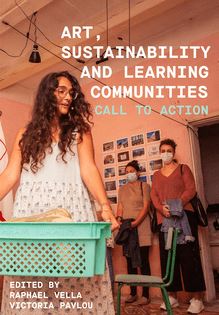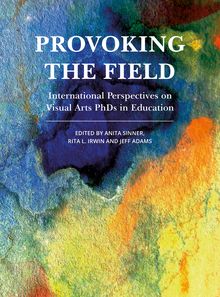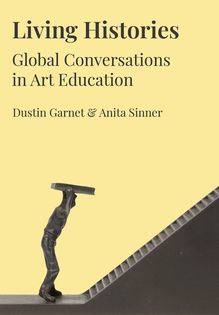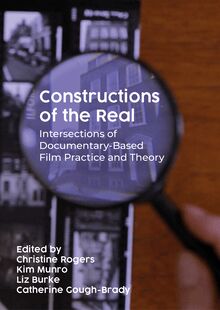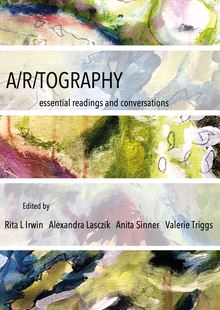-
 Univers
Univers
-
 Ebooks
Ebooks
-
 Livres audio
Livres audio
-
 Presse
Presse
-
 Podcasts
Podcasts
-
 BD
BD
-
 Documents
Documents
-
- Cours
- Révisions
- Ressources pédagogiques
- Sciences de l’éducation
- Manuels scolaires
- Langues
- Travaux de classe
- Annales de BEP
- Etudes supérieures
- Maternelle et primaire
- Fiches de lecture
- Orientation scolaire
- Méthodologie
- Corrigés de devoir
- Annales d’examens et concours
- Annales du bac
- Annales du brevet
- Rapports de stage
La lecture à portée de main
Vous pourrez modifier la taille du texte de cet ouvrage
Découvre YouScribe en t'inscrivant gratuitement
Je m'inscrisDécouvre YouScribe en t'inscrivant gratuitement
Je m'inscrisEn savoir plus
Vous pourrez modifier la taille du texte de cet ouvrage
En savoir plus

Description
Provoking the Field invites debate on, and provides an essential resource for, transnational arts-based scholars engaged in critical analyses of international visual arts education and its enquiry in doctoral research. Divided into three parts – doctoral processes, doctoral practices and doctoral programmes – the volume interrogates education in both formal and informal learning environments, ranging from schools to post-secondary institutions to community and adult education.
This book brings together a global range of authors to examine visual arts PhDs using diverse theoretical perspectives; innovative arts and hybrid methodologies; institutional relationships and scholarly practices; and voices from the field in the form of site-specific cases. A compendium of leading voices in arts education, Provoking the Field provides a diverse range of perspectives on arts enquiry, and a comprehensive study of the state of visual arts PhDs in education.
Introduction
Part 1: Provoking Doctoral Processes
Chapter 1: The Knowledge Creation Spectrum
Michael Biggs
Chapter 2" Interpolation and Relationality: Extending the Field through Creative Arts and Indigenous Research Approaches
Estelle Barrett
Chapter 3: Transformative Interventions: Creative Practices in an Education Doctorate Programme
Jeff Adams and Emma Arya-Manesh
Chapter 4: Art-Based Action Research: Participatory Art Education Research for the North
Timo Jokela, Maria Huhmarniemi and Mirja Hiltunen
Chapter 5: Researching the Unknown through Arts-Based Research to Promote Pedagogical Imagination
Fernando Hernández-Hernández
Chapter 6: Taking Shape: Visual Appearance and Theory
Brooke Hofsess, Karina Riddett and Richard Siegesmund
Part 2: Provoking Doctoral Practices
Chapter 7: When is a Red Shoe not a Red Shoe? Conceptual Framing and the Consequences for the 'Object' in Virtual Research
Barbara Bolt
Chapter 8: How Can Artistic Research (Still) Be Disruptive?
Natalia Calderón
Chapter 9: Artmaking as Entanglement: Conceptualising Agency through a Diffractive Methodology
Ramya Ravisankar
Chapter 10: A/R/Tographic Rhythm: Opening Conversations of Resistance and Accommodation as Scholarly Provocation
Anita Sinner, Verónica Sahagún Sánchez, Jennifer Wicks and Darlene St. Georges
Chapter 11: To Reach the Unreached: Rhythms of Issues, Reflections, Writings and Art Practices
Jo Chiung Hua Chen
Chapter 12: Artistic Event as Pedagogy
Belidson Dias and Tatiana Fernández
Chapter 13: Parsing Creative Influence through Comparative Visual Research Methods
Justin B. Makemson
Chapter 14: Artworks in Residence: Semiosis, Transmediation and ZPD
Julie Wren, Susan Wright and Marnee Watkins
Chapter 15: Connections, Disruptions and Reconfigurations: The Implications of Aesthetic Experience for Doctoral Research in the Visual Arts
Boyd White and April Mandrona
Part 3: Provoking Doctoral Programmes
Chapter 16: Navigating Ethics Protocols for Artistic Research: Strategies for Graduate Student Researchers
Lorrie Blair
Chapter 17: Examining the Case for Artful Participatory Inquiry in the Visual Art Education Doctorate
Kathryn Grushka and Allyson Holbrook
Chapter 8: Some Iberian Perspectives about Arts-Based and Artistic Research in Arts Education
Teresa Torres de Eça and Ângela Saldanha
Chapter 19: Finnish Arts-Based and Artistic Dissertations in Context: Explorations, Interventions and Glocal Interpretations
Mira Kallio-Tavin and Kevin Tavin
Chapter 20: Barrier or Catalyst: Cross-Cultural and Language Issues for Doctoral Researchers in Japan
Toshio Naoe
Chapter 21: A Research Profile of Visual Arts Theses in Education in Turkey
Suzan Duygu Bedir Eristi
Chapter 22: Qualities of Artmaking in Arts-based Educational Research Dissertations
Alison Shields and Rita L. Irwin
Notes on Contributors
Index
Sujets
Informations
| Publié par | Intellect Books |
| Date de parution | 13 mai 2019 |
| Nombre de lectures | 2 |
| EAN13 | 9781789380279 |
| Langue | English |
Informations légales : prix de location à la page 0,3000€. Cette information est donnée uniquement à titre indicatif conformément à la législation en vigueur.
Extrait
First published in the UK in 2019 by
Intellect, The Mill, Parnall Road, Fishponds, Bristol, BS16 3JG, UK
First published in the USA in 2019 by
Intellect, The University of Chicago Press, 1427 E. 60th Street,
Chicago, IL 60637, USA
Copyright © 2019 Intellect Ltd
All rights reserved. No part of this publication may be reproduced, stored in a retrieval system, or transmitted, in any form or by any means, electronic, mechanical, photocopying, recording, or otherwise, without written permission.
A catalogue record for this book is available from the British Library.
Copy-editor: MPS Technologies
Cover designer: Alex Szumlas
Production managers: Katie Evans and Emma Berrill
Typesetting: Contentra Technologies
Print ISBN: 978-1-78320-991-0
ePDF ISBN: 978-1-78938-028-6
ePUB ISBN: 978-1-78938-027-9
This book was published with the support of a Partnership Development Grant from the Social Sciences and Humanities Research Council of Canada (890-2014-0065: The Pedagogic Turn to Art as Research: A Comparative International Study of Art Education). Grants were also received from Concordia University through the Office of Research.
Printed and bound by CPI, United Kingdom.
This is a peer-reviewed publication.
Contents
Introduction
Part 1: Provoking Doctoral Processes
Chapter 1: The Knowledge Creation Spectrum
Michael Biggs
Chapter 2: Interpolation and Relationality: Extending the Field through Creative Arts and Indigenous Research Approaches
Estelle Barrett
Chapter 3: Transformative Interventions: Creative Practices in an Education Doctorate Programme
Jeff Adams and Emma Arya-Manesh
Chapter 4: Art-Based Action Research: Participatory Art Education Research for the North
Timo Jokela, Maria Huhmarniemi and Mirja Hiltunen
Chapter 5: Researching the Unknown through Arts-Based Research to Promote Pedagogical Imagination
Fernando Hernández-Hernández
Chapter 6: Taking Shape: Visual Appearance and Theory
Brooke Hofsess, Karinna Riddett and Richard Siegesmund
Part 2: Provoking Doctoral Practices
Chapter 7: When Is a Red Shoe not a Red Shoe? Conceptual Framing and the Consequences for the ‘Object’ in Visual Research
Barbara Bolt
Chapter 8: How Can Artistic Research (Still) Be Disruptive?
Natalia Calderón
Chapter 9: Artmaking as Entanglement: Conceptualizing Agency through a Diffractive Methodology
Ramya Ravisankar
Chapter 10: A/R/Tographic Rhythm: Opening Conversations of Resistance and Accommodation as Scholarly Provocation
Anita Sinner, Verónica Sahagún Sánchez, Jennifer Wicks and Darlene St. Georges
Chapter 11: To Reach the Unreached: Rhythms of Issues, Reflections, Writings and Art Practices
Jo Chiung Hua Chen
Chapter 12: Artistic Event as Pedagogy
Belidson Dias and Tatiana Fernández
Chapter 13: Parsing Creative Influence through Comparative Visual Research Methods
Justin B. Makemson
Chapter 14: Artworks in Residence: Semiosis, Transmediation and ZPD
Julie Wren, Susan Wright and Marnee Watkins
Chapter 15: Connections, Disruptions and Reconfigurations: The Implications of Aesthetic Experience for Doctoral Research in the Visual Arts
Boyd White and April Mandrona
Part 3: Provoking Doctoral Programmes
Chapter 16: Navigating Ethics Protocols for Artistic Research: Strategies for Graduate Student Researchers
Lorrie Blair
Chapter 17: Examining the Case for Artful Participatory Inquiry in the Visual Art Education Doctorate
Kathryn Grushka and Allyson Holbrook
Chapter 18: Some Iberian Perspectives about Arts-Based and Artistic Research in Arts Education
Teresa Torres de Eça and Ângela Saldanha
Chapter 19: Finnish Arts-Based and Artistic Dissertations in Context: Explorations, Interventions and Glocal Interpretations
Mira Kallio-Tavin and Kevin Tavin
Chapter 20: Barrier or Catalyst: Cross-Cultural and Language Issues for Doctoral Researchers in Japan
Toshio Naoe
Chapter 21: A Research Profile of Visual Arts Theses in Education in Turkey
Suzan Duygu Bedir Erişti
Chapter 22: Qualities of Artmaking in Arts-Based Educational Research Dissertations
Alison Shields and Rita L. Irwin
Notes on Contributors
Index
Introduction
T he aim of this book is to open a conversazione, to invite debate on, and provide a resource for, arts researchers in education engaged in critical analysis and the articulation of such inquiry in doctoral studies. Provoking the Field encompasses creative acts and actions as part of the wider constellation of educational research, and advances pedagogical and experimental perspectives, reflective and evaluative assessments, methodological deliberations, and ethical issues and concerns in relation to a host of topic areas in visual arts education.
Across the chapters in this volume, we oscillate between intimate imaginative praxis and the tensions of academic protocols, doing so in ways that locate best practices in the negotiation of considerations, depictions and uniqueness of research processes as part of a growing body of exemplary inquiry. Such inquiry explores what constitutes the arts in educational research and how new frameworks are evolving in the academy (see for example Barrett and Bolt 2010; Biggs and Karlsson 2010; Elkins 2014; Leavy 2018; Tavin and Hiltunen 2017; Viadel and Roldán 2017). Braiding these strands of inquiry together provides the latitude to interrogate diverse forms of arts inquiry by bridging visual with literary, performative and digital methods, as well as the relationship of the arts with qualitative approaches.
As a survey of the pulse of current practices, authors guide us in reimagining the nature of dissertation research and scholarly inquiry in three knowledge clusters: Provoking Doctoral Processes that questions theoretical and methodological perspectives alongside emergent activities; Provoking Doctoral Practices where innovative inquiries and hybrid approaches develop as applied methods in the visual arts; and Provoking Doctoral Programmes, in which institutional climates and proprieties of programmes are inscribed in the concrete deliverables of scholarship, be that the thesis, exegesis or body of creative work. Areas of interest span from formal and informal learning environments, such as schools to post-secondary institutions, as well as community and adult education, placing pedagogy at the forefront of our inquiry with chapters from Australia, Brazil, Canada, Finland, Japan, Portugal, Spain, Taiwan, Turkey, the United Kingdom and the United States. We address questions including but not limited to: what is visual arts education and how does it take shape in doctoral research? How are visually oriented research methodologies being applied? What educational theories are widening debates concerning the visual arts in doctoral research? How might best practices be adapted cross-culturally?
Each section in the book offers compelling perspectives in which arts scholars and recent PhD graduates in the field of art education help inculcate deeper understandings of the interconnections among a growing international community of inquiry. In this way, arts dissertations as ‘possibility spaces’ (DeLanda 2016) move beyond the orthodox of standardized research practices, to open ways of thinking, doing and expressing the doctoral experience as unfolding, uncertain and potentially unexpected. Possibility spaces are active and flexible encounters, revealing the mediation of theory and practice as emotional, sensory and/or experiential knowledge, despite the existence of what has been described as a ‘climate of extreme instrumentalism in higher education’ (Macleod and Chapman 2014: 138). DeLanda’s (2016) proposition ‘lives’ in why the arts as scholarly gestures are influencing this juncture in the academy, where deliberating on ‘ when is a dissertation’ underscores how discourse is being imagined beyond traditional models of what constitutes academic study. Broadening parameters of ‘thinking-with’, authors in this collection embrace a conjunctive space of and , bridging interpretive lenses to recognize the growing influences of post-humanism and new materiality. The following chapters evoke issues and priorities concerning the notion of researching in situ, with a wide spectrum of representational to nonrepresentational inquiry, as we pursue our educative prerogatives as intensities that are imaginative, rhythmic, organic engagements. Such degrees of difference embody the freedom to think in new ways within institutional parameters, as a kind of social cartography, where the arts are a catalyst for envisioning scholarship, and for making investigation, interpretation and evaluation more relational, conditional and contingent, while focusing on differentials within the research design and deliverables.
A compelling attribute of this collection is the breadth of terms invoked to articulate research design by individual authors, including diverse understandings of and hybrid mixing between practice-based, artistic research, arts-based, arts-informed, a/r/tography, as well as numerous customized methods shaped to meet the scope of inquiry in a given time and place. Michael Biggs and Henrik Karlsson, in their seminal text concerning research in the arts, note that such ‘terminological differences indicate[d] an underlying common view that there was a new and problematic activity emerging in the creative and performing arts’, and for us too, to move this conversation forward, it may be ‘more important to find similarities’ (2010: xiii). For visual art educators in this collection, our emphasis is on generative concept creation as a way into the contours of changing discourses of art education. It is the refinement and diversification of practice that arguably makes the arts as research a living, sustainable mode of inquiry. In this way the arts as research becomes an adaptive process, with multiplicity, subjectivity and relationality in the act and action of inquiry, unbound by the restrictions of convent
-
 Univers
Univers
-
 Ebooks
Ebooks
-
 Livres audio
Livres audio
-
 Presse
Presse
-
 Podcasts
Podcasts
-
 BD
BD
-
 Documents
Documents
-
Jeunesse
-
Littérature
-
Ressources professionnelles
-
Santé et bien-être
-
Savoirs
-
Education
-
Loisirs et hobbies
-
Art, musique et cinéma
-
Actualité et débat de société
-
Jeunesse
-
Littérature
-
Ressources professionnelles
-
Santé et bien-être
-
Savoirs
-
Education
-
Loisirs et hobbies
-
Art, musique et cinéma
-
Actualité et débat de société
-
Actualités
-
Lifestyle
-
Presse jeunesse
-
Presse professionnelle
-
Pratique
-
Presse sportive
-
Presse internationale
-
Culture & Médias
-
Action et Aventures
-
Science-fiction et Fantasy
-
Société
-
Jeunesse
-
Littérature
-
Ressources professionnelles
-
Santé et bien-être
-
Savoirs
-
Education
-
Loisirs et hobbies
-
Art, musique et cinéma
-
Actualité et débat de société
- Cours
- Révisions
- Ressources pédagogiques
- Sciences de l’éducation
- Manuels scolaires
- Langues
- Travaux de classe
- Annales de BEP
- Etudes supérieures
- Maternelle et primaire
- Fiches de lecture
- Orientation scolaire
- Méthodologie
- Corrigés de devoir
- Annales d’examens et concours
- Annales du bac
- Annales du brevet
- Rapports de stage
